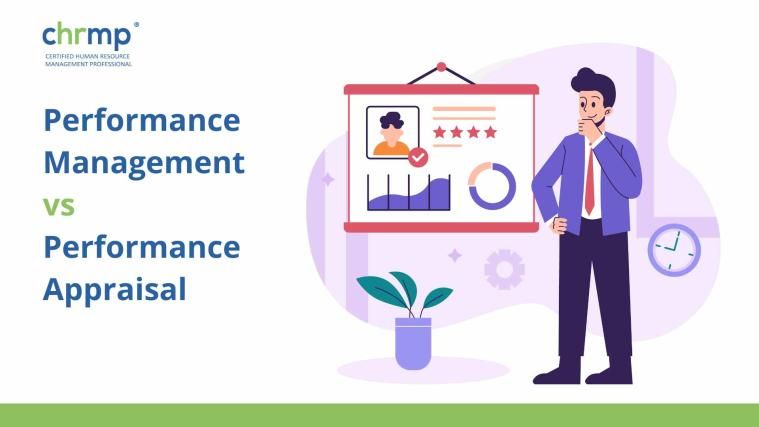

Performance management and performance appraisal are two important functions of the human resource department. Both represent distinct approaches with different methodologies, scopes, and implications.
In this blog, we shall dive into the debate of performance management vs. performance appraisal and explain the key differences between the two. We shall also look at the definitions, objectives, elements and types of performance management and performance appraisal.
Let’s get started.
Performance management is the HRM function that focuses on enhancing employee performance, engagement, and development within an organization. It is a comprehensive and ongoing process that involves setting clear performance expectations, regularly monitoring progress, providing feedback and coaching, and aligning individual goals with organizational objectives.
The goal of performance management is to create a performance-driven culture where employees understand their roles and responsibilities, receive continuous support, and have opportunities for growth and development.
It lays emphasis on a proactive approach to improving performance through regular communication, goal setting, skill enhancement and recognizing achievements, and goes beyond just evaluation and appraisal.
Key elements of performance management include:
Here are the three key objectives of performance management:
Performance management aims to align individual goals with larger organizational objectives and aims to set clear, measurable goals for employees that are in tune with the organization’s objectives and help achieve these goals in order to achieve organizational success in the long-run.
Performance management is aimed at improving the performance of employees by providing regular feedback, coaching, and support to help individuals enhance their skills, overcome challenges, and achieve their full potential.
Performance management also focuses on employee development and involves identifying areas for improvement and creating personalized development plans to enhance skills, knowledge, and competencies of employees. By investing in employee growth, organizations can build a talented and capable workforce.
A performance appraisal is a systematic process used to assess the job performance of individual employees and provide feedback. It is also known as a performance evaluation or a performance review.
A performance appraisal involves a formal evaluation conducted annually or at regular intervals to measure an employee’s achievements, strengths, areas for improvement, and overall contribution to the organization.
There are several types of performance appraisal methods used by organizations:
The key components of a performance appraisal may include:
Here are 4 key objectives of a performance appraisal:
The primary objective of a performance appraisal is to evaluate an employee’s job performance based on predetermined criteria. It provides a structured process to assess achievements, strengths, and areas for improvement. The feedback provided during the appraisal helps employees understand how they are performing and identify areas where they can enhance their skills and capabilities.
Performance appraisals aim to support employee development and growth. By identifying areas for improvement and setting development goals, employees can receive guidance, training, and support to enhance their performance and expand their skill set. This objective promotes continuous learning and professional development.
Performance appraisals facilitate the establishment of new performance goals or the review of existing ones. By setting measurable goals and aligning them with organizational objectives, employees are motivated to contribute to the overall success of the organization.
This objective ensures that employees are clear about their responsibilities and have a direction for their work.
Performance appraisals provide a formal platform for communication between managers and employees. It encourages open dialogue, transparency, and the exchange of feedback. Regular performance discussions during the appraisal process foster employee engagement, enable the resolution of concerns, and promote a collaborative working relationship.
Performance management and performance appraisal are two distinct concepts that differ in their purpose, timeframe, focus, feedback orientation, and use of data.
Performance management is a holistic and ongoing process aimed at improving employee performance, engagement, and development. It emphasizes continuous feedback, goal setting, skill development, and aligning individual goals with organizational objectives.
It is a proactive approach that fosters a performance-driven culture. On the other hand, performance appraisal is a specific component of performance management that typically occurs annually or at specific intervals.
Its primary focus is the evaluation and assessment of an employee’s performance against predefined criteria or goals. It tends to have a more formal and structured feedback process, often provided by the manager to the employee.
While performance management utilizes a broader range of data and inputs, including ongoing performance discussions and real-time feedback, performance appraisal relies more on a snapshot of performance during a specific period, often using rating scales or predefined criteria.
Performance management and performance appraisal share some similarities in their overall objective and their impact on employee development. Here are the areas where they are similar:
Both performance management and performance appraisal aim to improve employee performance. They provide opportunities for feedback, goal setting, and identifying areas for development. Both processes seek to enhance employee capabilities and contribute to organizational success.
Both approaches involve aligning individual goals with organizational objectives. They ensure that employees’ efforts are directed towards achieving the strategic goals and priorities of the organization. By setting clear expectations, performance management and performance appraisal help employees understand their role in contributing to the broader organizational goals.
Both processes involve feedback and communication between managers and employees. Whether through ongoing discussions in performance management or formal evaluations in performance appraisal, feedback plays a vital role in informing employees about their performance, strengths, and areas for improvement. Effective communication facilitates understanding, clarity, and collaboration between managers and employees.
Performance management and performance appraisal emphasize employee development. They provide opportunities for identifying training needs, skill enhancement, and career advancement. By identifying strengths and areas for improvement, both processes contribute to creating developmental plans that support employees in reaching their full potential.
In conclusion , understanding the difference between performance management and performance appraisal is crucial.
Performance management is a comprehensive, ongoing process focused on continuous improvement and employee development, while performance appraisal is a specific event within that process, evaluating performance at a specific time.
By implementing effective performance management practices and utilizing performance appraisal strategically, organizations can foster growth, engagement, and align goals for success.
Q1: What is the main difference between performance management and performance appraisal?
A1: While performance management is a comprehensive, ongoing process that focuses on improving employee performance, engagement, and development, performance appraisal is a specific component within performance management that involves evaluating an employee’s performance at a particular point in time.
Q2: Are performance management and performance appraisal the same thing?
A2: No, they are not the same. Performance management is a broader approach that encompasses various activities such as goal setting, feedback, coaching, and development planning, whereas performance appraisal is a specific event within performance management that evaluates performance using predefined criteria.
Q3: How often should performance appraisals be conducted?
A3: Performance appraisals are typically conducted annually or at specific intervals, depending on the organization’s policies. However, some organizations may opt for more frequent evaluations, such as semi-annual or quarterly reviews, to ensure timely feedback and goal tracking.
Q4: What are the benefits of performance management for employees?
A4: Performance management benefits employees by providing regular feedback, fostering skill development, and aligning their goals with organizational objectives. It creates opportunities for recognition, career growth, and personal development, enhancing job satisfaction and engagement.
© 2007-2025 CHRMP| All Rights Reserved | Powered by Ripples Learning & Research Private Limited

Fill in the below details to get a HRBP Advanced Program Plan.
